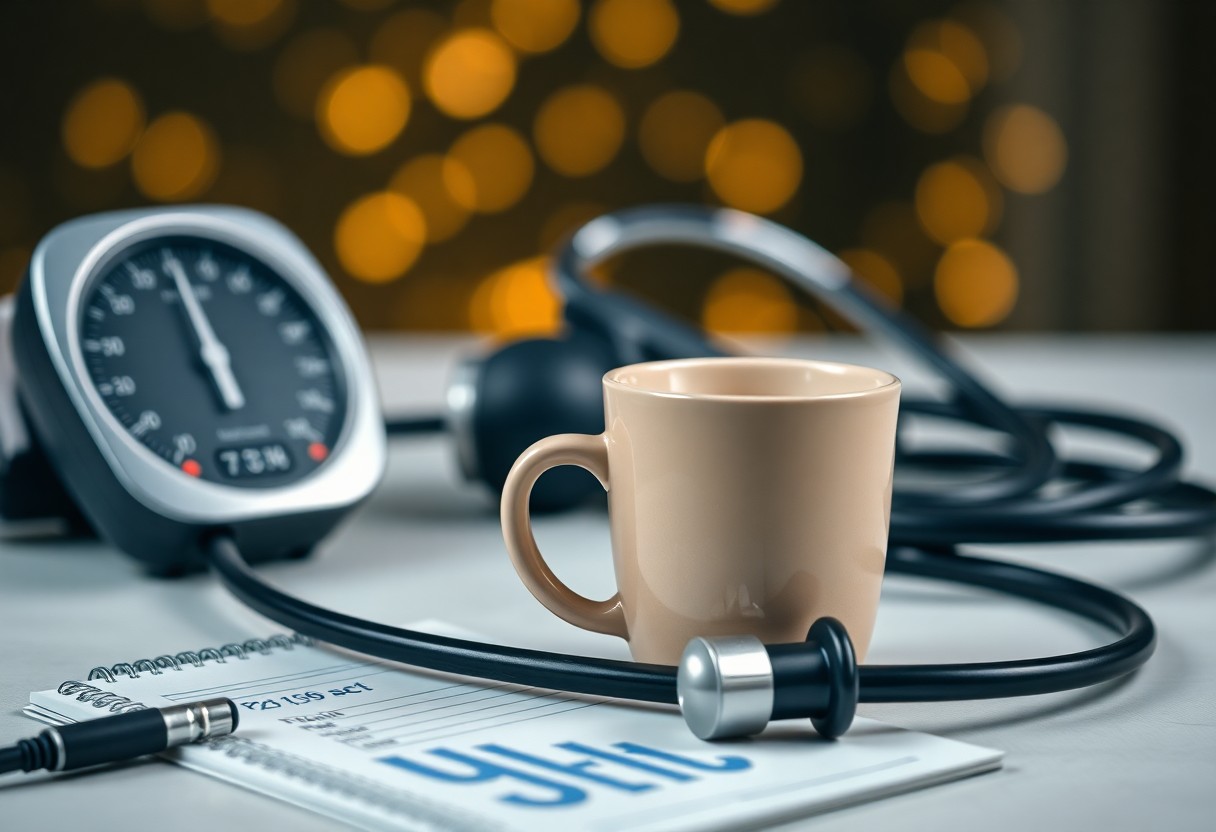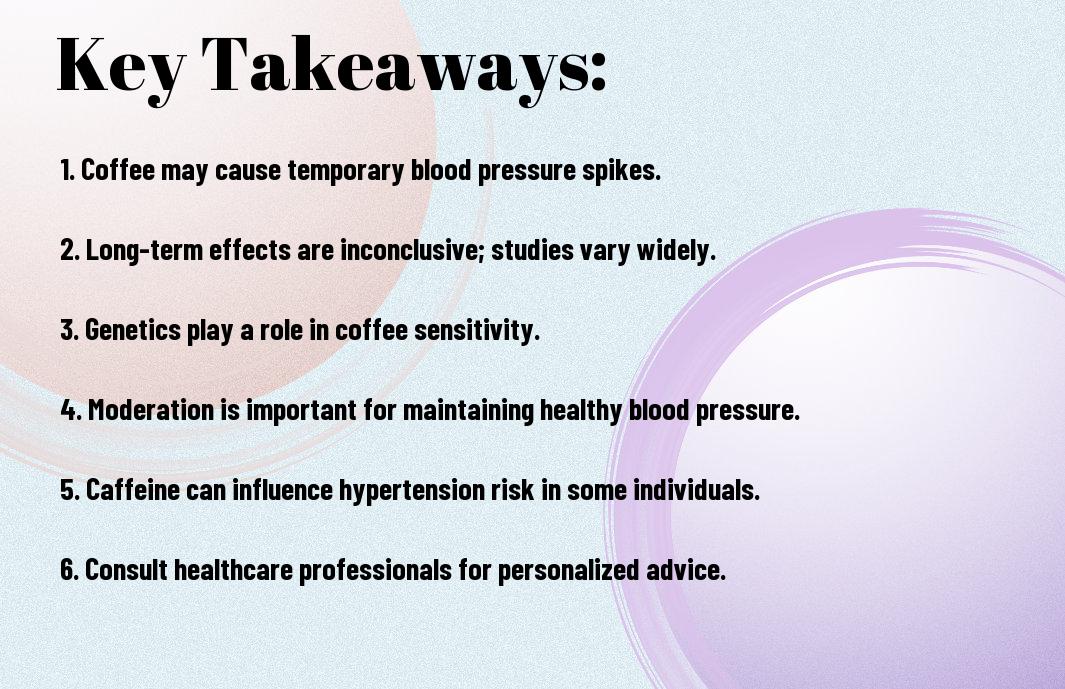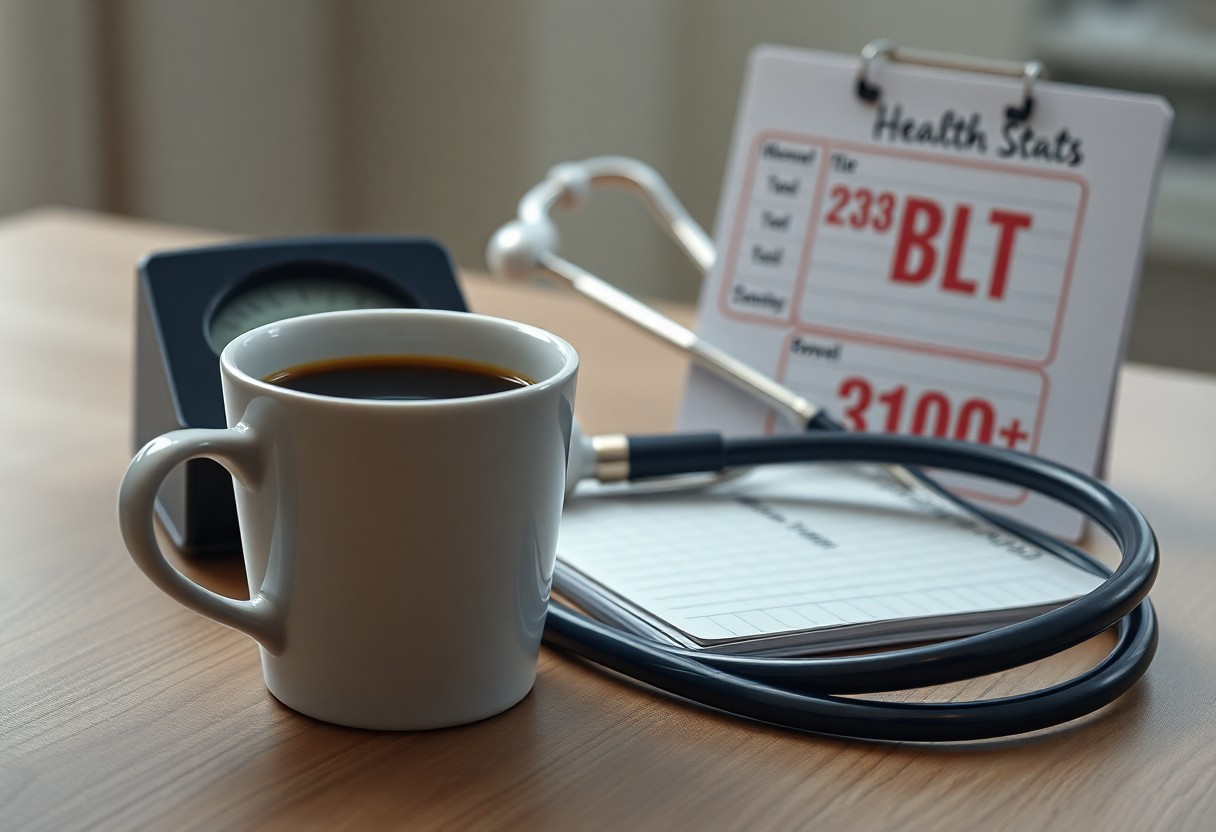Over the years, numerous studies have explored the connection between coffee consumption and high blood pressure. If you’re a coffee lover, you might wonder how your daily cup affects your cardiovascular health. Some research suggests that consuming caffeine can lead to a temporary increase in blood pressure, especially in those who are sensitive to it. However, other studies indicate that long-term coffee drinkers may adapt to its effects, leading to minimal impact on overall blood pressure. In this post, we will investigate deeper into what the latest research reveals about coffee and hypertension.

Key Takeaways:
- Moderate Consumption: Research indicates that moderate coffee intake (about 3-4 cups per day) typically does not lead to long-term high blood pressure in most individuals.
- Temporary Effects: Caffeine can cause temporary spikes in blood pressure, particularly in those who are sensitive to caffeine or do not consume it regularly.
- Individual Variation: The effect of coffee on blood pressure can vary widely among individuals due to factors such as genetics, overall diet, and lifestyle habits.

Understanding Blood Pressure
Your knowledge about blood pressure is vital for grasping how lifestyle choices, such as drinking coffee, may affect your health. For those wondering Does coffee raise blood pressure, and should I drink it …, understanding blood pressure lays the groundwork for further insights.
Definition of Blood Pressure
Against a backdrop of varying factors, blood pressure is the force of blood against the walls of your arteries. It is measured in millimeters of mercury (mmHg) and is expressed as two numbers: systolic (pressure during heartbeats) over diastolic (pressure between heartbeats).
Factors Influencing Blood Pressure
After examining blood pressure, it’s important to recognize the multitude of factors that can influence it, including:
- Diet – High salt intake can elevate blood pressure.
- Physical activity – Sedentary lifestyles can contribute to hypertension.
- Stress – Chronic stress may lead to temporary spikes in blood pressure.
- Genetics – Family history can play a significant role in determining your blood pressure.
- Weight – Being overweight or obese typically increases the risk of hypertension.
Any individual looking to maintain or lower blood pressure should consider these factors.
In addition to the above, environmental elements can also impact your blood pressure. Factors like temperature and altitude may lead to physiological changes in your body, resulting in fluctuations. Furthermore, sleep patterns and medication can also contribute to your blood pressure levels.
- Sleep quality – Poor sleep can elevate blood pressure.
- Alcohol consumption – Excessive drinking can raise levels.
- Caffeine intake – Might temporarily increase blood pressure.
- Smoking – Tobacco use is known to harm your cardiovascular health.
Any lifestyle adjustments you make can influence your blood pressure management.
Hypertension: Causes and Effects
Causes of hypertension (high blood pressure) can range from unhealthy lifestyle choices to various physiological conditions. Factors like obesity, chronic kidney disease, and hormonal disorders can contribute to persistent hypertension.
Even though hypertension often goes unnoticed, it can lead to severe health impacts, such as heart disease, stroke, and kidney damage. This condition forces your heart to work harder and can damage blood vessels over time, increasing risks significantly. Addressing hypertension early through lifestyle changes or medication is important for maintaining your overall health.

The Role of Caffeine
Clearly, understanding the role of caffeine is necessary in exploring whether drinking coffee affects your blood pressure. Caffeine is a natural stimulant found in various plants and consumed worldwide in beverages like coffee, tea, and energy drinks. It primarily affects your central nervous system, helping to increase alertness and reduce fatigue.
What is Caffeine?
Any discussion about coffee and blood pressure must include a look at caffeine itself. Caffeine is a central nervous system stimulant that temporarily wards off drowsiness and restores alertness. It’s the compound responsible for the invigorating effects you experience after consuming coffee or other caffeinated beverages.
Caffeine Sources
Against a backdrop of various options, caffeine is commonly found in many everyday beverages and foods. Besides coffee and tea, you can find it in soft drinks, energy drinks, chocolate, and some medications. It’s vital to be aware of how much caffeine you consume daily from these various sources.
For instance, the amount of caffeine in an 8-ounce cup of coffee can vary significantly, ranging from about 80 to 100 milligrams. Comparatively, a typical can of soda contains around 30 to 55 milligrams. If you consume multiple servings of these beverages throughout the day, the cumulative caffeine effect can influence your body’s response and should be accounted for in your overall intake.
Mechanism of Action in the Body
Beside being a popular stimulant, caffeine’s mechanism of action plays a vital role in its effects on your body. It primarily works by blocking adenosine receptors in the brain, which leads to increased dopamine production and can elevate blood pressure temporarily.
Consequently, this increase in blood pressure can be significant if you are sensitive to caffeine or consume large amounts. Understanding this mechanism helps you assess how caffeine could impact your cardiovascular health overall.
Research on Coffee and Blood Pressure
After examining the available literature, it’s clear that coffee consumption has been a topic of interest within the research community, especially concerning its effects on your blood pressure levels. Studies have produced mixed results, and while some show a notable rise in blood pressure, others suggest that the body may adapt over time.
Overview of Key Studies
Before venturing into specific aspects, numerous key studies have highlighted various outcomes related to coffee consumption and blood pressure. Notably, some studies indicate that moderate coffee intake could lead to an increase in blood pressure, but the effects may vary significantly based on individual response and overall lifestyle.
Short-term Effects of Coffee Consumption
With your morning cup of coffee, you may experience a temporary spike in your blood pressure. This increase is often linked to caffeine, which can stimulate the cardiovascular system and result in a brief elevation in your readings.
Plus, when you consume coffee, especially in larger amounts, the caffeine activates your nervous system, which can cause your heart to pump faster. This leads to increased cardiac output, meaning higher blood pressure shortly after consumption. However, this effect tends to diminish after regular consumption as your body may develop a tolerance to caffeine over time.
Long-term Effects of Regular Coffee Drinking
Coffee drinking over an extended period may have different consequences for your blood pressure. While short-term spikes are common, studies often indicate that long-term coffee drinkers experience less consistent elevated blood pressure levels.
Studies suggest that individuals who consume coffee regularly may actually develop a level of *adaptation*, leading to fewer fluctuations in blood pressure over time. Interestingly, some research hints that long-term, moderate coffee consumption might even be associated with a lower risk of developing hypertension, possibly due to beneficial compounds found in coffee beyond just caffeine.
The Role of Dose and Duration
The effect of coffee on your blood pressure can heavily depend on both the dose and duration of consumption. Higher quantities of caffeine are often correlated with greater increases in blood pressure, particularly in those who are sensitive to caffeine.
Long-term studies often point out that those who enjoy coffee in moderation see less pronounced effects on blood pressure compared to heavy drinkers. Therefore, understanding your own tolerance and adjusting your coffee intake may help in managing your blood pressure effectively while still enjoying your daily cup.
Coffee Types and Blood Pressure Impact
Despite the widespread consumption of coffee, its impact on blood pressure can vary significantly based on the type of coffee you consume. Various factors such as caffeine content, brewing methods, and added ingredients can influence how your body responds to coffee. Here’s how different coffee types affect your blood pressure:
| Type of Coffee | Impact on Blood Pressure |
|---|---|
| Regular Coffee | May cause short-term spikes in blood pressure. |
| Decaffeinated Coffee | Generally has less impact on blood pressure. |
| Espresso | Can lead to significant increases due to high caffeine concentration. |
| Instant Coffee | Contains less caffeine than brewed but can still affect blood pressure. |
| Cold Brew | Usually has a lower acidity and may affect blood pressure differently. |
Regular vs. Decaffeinated Coffee
Before you choose your coffee type, consider the differences between regular and decaffeinated coffee. Regular coffee contains caffeine, which can cause a temporary increase in blood pressure, especially in those sensitive to caffeine. On the other hand, decaffeinated coffee typically has a milder effect, making it a safer option for those concerned about hypertension.
Brew Methods and Their Influence
Below are various brewing methods and their impact on your blood pressure. Different methods extract caffeine and other compounds differently, leading to variations in how coffee affects your health. For instance, French press coffee contains higher levels of cafestol, a compound that can elevate cholesterol and potentially impact blood pressure.
Another brewing method to consider is the espresso process, which extracts more caffeine in a shorter amount of time, leading to a more intense impact on blood pressure. In contrast, cold brew coffee often results in a smoother taste and a lower caffeine concentration, yielding less of an impact on your blood pressure. Be mindful of how each method can change the effects on your health.
Additives: Sugar and Creamer Effects
Influence from additives, such as sugar and creamer, can also significantly alter how coffee affects your blood pressure. Adding large amounts of sugar can lead to other health issues, while creamers often contain fats that might impact your overall cardiovascular health. It’s important to be cautious about how much and what you add to your coffee.
Brew methods and additives both play important roles in determining how coffee affects your blood pressure. By opting for less sugar and healthier creamer alternatives, you can enjoy your coffee while minimizing potential health risks. Additionally, if you are sensitive to caffeine, consider switching to decaffeinated or cold brew to maintain your blood pressure within a healthy range. After evaluating all these factors, you’ll have a clearer picture of how your coffee habits might influence your well-being.
Individual Variability
Now, it’s important to understand that the relationship between coffee consumption and high blood pressure can vary greatly among individuals. Factors such as genetics, tolerance to caffeine, and overall diet and lifestyle play significant roles in determining how coffee affects your blood pressure.
Genetic Factors Influencing Blood Pressure Response
Below are some genetic elements that may affect your response to coffee:
- Genetic variants in caffeine metabolism
- Individual blood pressure genetics
- Family history of hypertension
The interplay between these factors can lead to differences in blood pressure changes after consuming coffee.
Tolerance to Caffeine
With regular coffee consumption, you may develop a degree of tolerance to caffeine. This means that your body becomes adapted to caffeine’s effects, potentially mitigating its impact on blood pressure.
Hence, as you consume coffee more frequently, your body’s response may diminish. Some individuals may experience only a temporary spike in blood pressure, while others could remain sensitive. If you have a high tolerance, you might find that coffee does not significantly affect your blood pressure, while those without such tolerance may notice greater fluctuations.
Impact of Overall Diet and Lifestyle
Blood pressure is not solely determined by caffeine consumption; your overall diet and lifestyle choices matter significantly. A diet high in sodium paired with low potassium intake, sedentary behavior, and high stress levels can exacerbate blood pressure issues.
The combination of these lifestyle factors can lead to a much higher risk of developing hypertension. Adopting a balanced diet, engaging in regular physical activity, and managing stress effectively can help moderate your blood pressure, thus mitigating any potential negative effects of coffee consumption.
Recommendations and Guidelines
Many individuals wonder how to enjoy their daily cup of coffee without risking their cardiovascular health. Understanding safe coffee consumption levels, monitoring your blood pressure, and following professional recommendations are important steps toward maintaining your health while indulging in this popular beverage.
Understanding Safe Coffee Consumption Levels
On average, most research indicates that up to 3 to 4 cups of coffee per day is considered safe for most adults. However, individual tolerance can vary significantly. It’s best to assess your own response to coffee and adjust your intake accordingly to avoid any adverse effects.
Monitoring Blood Pressure for Coffee Drinkers
Across different studies, monitoring your blood pressure is important if you consume coffee regularly. Regular measurement can help you determine how your body reacts to caffeine, allowing you to make informed decisions about your coffee intake.
Indeed, if you find that your blood pressure rises after consuming coffee, it may be wise to reduce your intake or switch to decaffeinated options. Keeping a record of your readings can help you identify patterns and understand how your body responds to coffee consumption, thereby empowering you to make healthier choices.
Professional Recommendations from Health Organizations
Any reputable health organization suggests that moderate coffee consumption is generally safe for most individuals. However, if you have existing health conditions, particularly related to hypertension, it’s important to consult your healthcare provider about your coffee habits.
Recommendations from organizations such as the AHA (American Heart Association) often highlight the importance of moderation and personalized advice. If you have concerns about your blood pressure, engaging in a discussion with your doctor can help you tailor a coffee consumption plan that suits your specific health needs.
Final Words
Conclusively, while you might enjoy your daily cup of coffee, current research suggests that moderate consumption isn’t likely to cause significant spikes in your blood pressure for most people. However, individual responses can vary, so it’s important to monitor how your body reacts. If you’re concerned about hypertension or have a history of cardiovascular issues, you may want to consult with a healthcare professional about your coffee intake and explore other lifestyle modifications to support your overall health.
FAQ
Q: Does drinking coffee immediately raise blood pressure?
A: Yes, drinking coffee can lead to a temporary increase in blood pressure for some individuals. This effect is often due to the caffeine content in coffee, which can stimulate the heart and narrow blood vessels, resulting in a short-term spike in blood pressure levels.
Q: How long does the blood pressure increase from coffee last?
A: The rise in blood pressure from coffee typically lasts for about 1-2 hours after consumption. However, the duration can vary based on individual sensitivity to caffeine and amount of coffee consumed. For most people, blood pressure usually returns to baseline levels after this period.
Q: Does coffee consumption lead to chronic high blood pressure?
A: Research findings are mixed regarding long-term effects of coffee on blood pressure. While some studies suggest that regular coffee consumption may not be associated with high blood pressure in the long term, other research indicates that those who are sensitive to caffeine may be at risk for elevated blood pressure with frequent intake.
Q: Should individuals with high blood pressure avoid coffee?
A: It is often advised that individuals with high blood pressure consult their healthcare provider about coffee consumption. Moderation is key, as some people may find that limiting or eliminating coffee helps manage their blood pressure better, while others may not see significant effects.
Q: Are there specific types of coffee that are better or worse for blood pressure?
A: The effects on blood pressure can depend on the type of coffee, the brewing method, and the amount consumed. Black coffee generally has less added sugar and calories compared to specialty coffee drinks, which may contain high levels of sugar and fat. Opting for black coffee or using minimal additives can be a better option for those concerned about blood pressure.
Q: Can other components in coffee, besides caffeine, affect blood pressure?
A: Yes, besides caffeine, coffee contains other compounds such as antioxidants that may influence cardiovascular health. Some studies suggest these antioxidants may contribute to lower heart disease risk, but the net effect on blood pressure can vary by individual. Overall, more research is needed to fully understand these interactions.
Q: How can I monitor my blood pressure if I drink coffee regularly?
A: If you consume coffee regularly and are concerned about your blood pressure, consider monitoring your blood pressure at different times—both before and after coffee consumption. Using a home blood pressure monitor can provide insights into how your body responds to coffee, and it can be helpful information to discuss with your healthcare provider.
